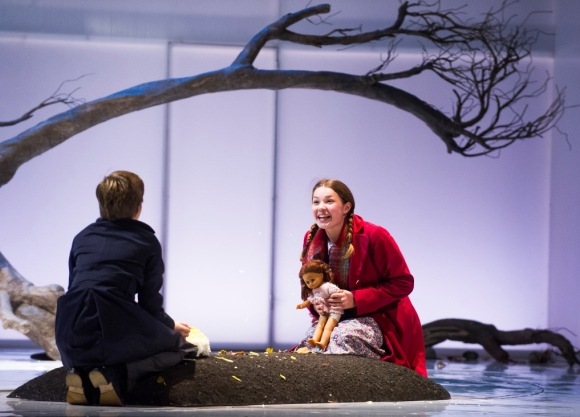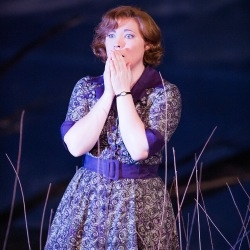The Turn of the Screw (Glyndebourne Tour)

© Tristram Kenton
An unnamed young woman (Natalya Romaniw) is appointed by a mysterious gentleman to look after two children in a secluded country house. When she arrives to take up her position horrors from the past return to haunt the present.
A paradox lies at the heart of Jonathan Kent‘s 2006 Glyndebourne production, set in the 1950s (at the time of the opera's composition) and now revived for the company’s autumn tour, because in his hands the ghosts themselves have never seemed more real; yet he injects hints galore to the contrary, from the Governess’s special interest in her male charge at the expense of his sister to the invisibility (for us) of the ghostly Quint the first time she sees him.

© Tristram Kenton
Britten’s fascination with paedophilia strains to proclaim itself during the final scene of act one. It is a seduction in all but name, a fact that makes Kent’s decision to set it in the children’s bathroom all the more disturbing – never more than when the ghostly Peter Quint scoops the boy from his bath and declares "I am King Midas with gold in his hand".
Paul Brown‘s fluid designs have an opulent virtuosity that stays long in the memory. A gnarled bough flies above the action like a wraith on a broomstick; scene changes are effected by an off-centre double revolve that recedes into the wings, while a vast lead-light window frame swivels and slants to suggest a range of locations: the house, a greenhouse, a church and, most cleverly, the lake where Miss Jessel drowned.
Conductor Leo McFall‘s taut but overly measured direction points up countless nuances in Britten’s score, not least the evocative introduction to act two in which the Glyndebourne Tour Orchestra’s daring swoops and harp glissandi accentuate Britten’s sense of theatre.
'quite the best Flora I have seen'
Clarion-voiced tenor Anthony Gregory is the youngest Quint you’re likely to encounter, a detail that lends an added frisson to his evil. He is joined by the excellent Anne Mason as Mrs Grose the housekeeper and by an unusually high-wattage pair of sopranos: there’s a superbly fearsome Miss Jessel from Miranda Keys, whom we associate more readily with Wagner and Strauss, while Romaniw’s own voice has more of a spinto kick than is usual in her role.
Treble Thomas Delgado-Little, who made such an outstanding impression in ETO’s King Priam, has signed up for another UK tour – this time as Miles. He is again excellent, if perhaps a little young for the role vocally, and has been expertly directed for this revival by Francesca Gilpin. The revelation, though, is a thirteen-year-old soprano who is quite the best Flora I have seen. What it is that prompts managements elsewhere to persist in hiring women for this child’s role baffles me – and here’s why, for Louise Moseley‘s performance is ideally characterised both vocally and dramatically: touching, believable and utterly right for the part.










